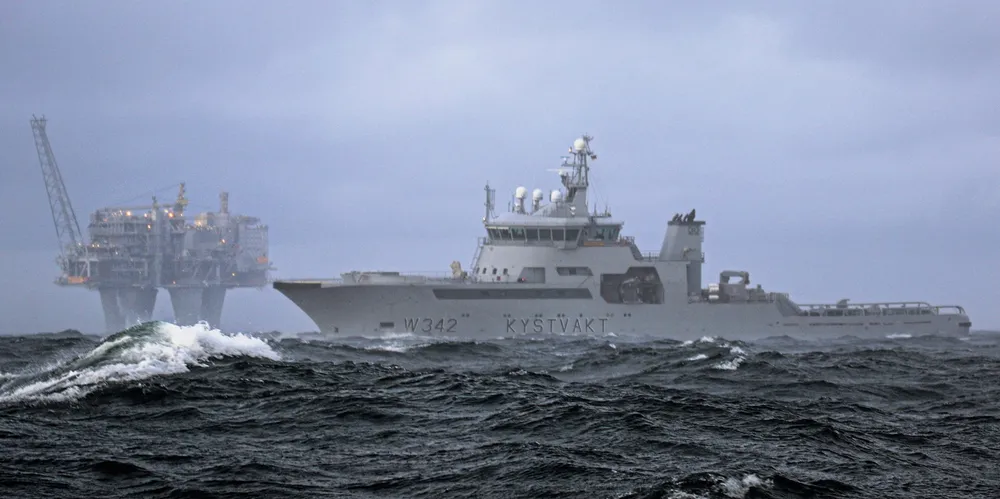'Arteries of modern economy' | Call on Nato to guard at-risk offshore energy infrastructure
German and Norwegian leaders will ask Nato secretary general to support cooperation underway to protect offshore oil & gas sector as concerns grow about terror attacks on wind plant at sea

German Chancellor Olaf Scholz and Norwegian Prime Minister Jonas Gahr Store ahead of a meeting with Nato secretary general Jens Stoltenberg said they will ask that a ‘coordination unit’ be set up for the protection of critical underwater infrastructure such as oil & gas and power export lines and telecommunication cables.
“Jonas [Gahr Store] and I also literally talked in depth about protecting the critical infrastructure on the seabed,” Scholz said.
“The attacks on the Nord Stream 1 and Nord Stream 2 pipelines have shown the great risks that exist here.”
Since Europe has curtailed delivery of Russian gas into the EU system, Norway has become the biggest exporter of energy to Germany, and now is also the biggest seller of fossil gas to the EU.
The Nordic nation also plans to become a major exporter of offshore wind power to Europe, and is weighing up construction of subsea power lines linking future Norwegian North Sea wind projects directly to Germany – infrastructure which could also be prone to attacks.
Norwegian industry minister Jan Christian Vestre at a speech today said his country wants to become a “world-leading offshore wind player” to diversify exports away from the oil & gas sector, with the ambition to “take 10% of the global offshore wind market, which entails a turnover of approximately NKr85bn ($8.66bn)”.
“If we succeed this decade, we will succeed in the next fifty,” he said, without detailing whether he mean the offshore wind supply chain or power exports, or both, when he describing the percentage share of the global market the country aims to take.
Germany took the decision after the Nordstream pipeline explosions to sail out three frigates to patrol Norwegian waters as a contribution to European reconnaissance operations, just after Store had ordered the military to protect his country’s vast offshore oil & gas export network.
Scholz yesterday added that international approaches need to be orchestrated more closely, and along with military forces involve police and other security services via the EU and private contractors. As for Nato, Scholz stressed the urgency to react quickly in the event of an emergency.
“We are unanimous in asking the Nato secretary general to set up a coordination unit for the protection of underwater infrastructure,” Scholz said.
“We also want to send a clear signal to the outside world. We take the protection of our critical infrastructure very seriously, and we don't want anyone to believe that attacks will go unpunished.”
While responsibility for the Nord Stream pipeline sabotage has yet to be proved, Russia is widely tipped to be behind the attacks – even though the pipelines are ultimately majority-owned by Saint-Petersburg-headquartered gas monopoly Gazprom, with the motive seen as a show of force to intimidate Western countries by highlighting the vulnerability of their marine energy infrastructure.
According to media reports, drones have also been sighted near vital power cables in the North Atlantic and near oil & gas infrastructure in the North Sea, and there are concerns Russia could sever power or internet cables there or through the Baltic Sea.
Arrests of Russian drone pilots in Norway
Store supported the initiative for Nato to coordinate the protection of marine infrastructure within the framework of defence ministers, saying: “The underwater infrastructure that the chancellor mentioned are basically arteries. They are arteries of the modern economy.
“Germany and Norway have been talking in recent weeks about how we can strengthen security for this infrastructure.”
Store added that drone flights over gas infrastructure and exploration rigs at sea had been spotted during the summer, leading to Norwegian police investigations and documentation.
“We have increased our surveillance and our observations, also with sensors. We see that there is now little or no drone activity around the platform,” Store said. “You also wanted and should know, of course, that the Norwegian police have arrested individual Russian citizens who were active with drones.
“This falls under the sanctions regime. There are further investigations in that direction,” Store added.
Scholz added Germany and Norway want to boost its close energy cooperation, in particular in offshore wind, the hydrogen economy, the expansion of renewable energy infrastructure and carbon capture and storage, without giving specific details.
(Copyright)